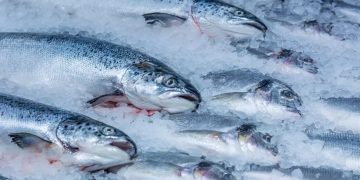
Benguela Blue Aqua Farming, a company focused on aquafarming, is targeting to start its salmon farming operation in the fourth quarter of 2025, with the first salmon harvest anticipated in the same period of 2026.
The project, which began in July 2022, seeks to raise 35,000 metric tonnes of Atlantic salmon annually in submersible net pens, eight kilometres off the coast of Namibia.
Benguela Blue Aqua Farming, Co-founder and Managing Director Johannes Aldrian expressed confidence in the company’s environmental practices, citing collaboration with scientific experts to ensure sustainability.
Regarding financing, Aldrian mentioned plans to secure commercial funding by the end of 2024, enabling construction and equipment acquisition.
He refrained from disclosing exact figures but noted the substantial resources available.
“We’ve partnered closely with the scientific department to ensure our activities don’t harm the environment. This is crucial for protecting our resources,” Aldrian said at the project’s ground-breaking ceremony on Thursday.
Aldrian highlighted the importance of aquafarming for the future of the fishing industry, stating “we believe aquafarming is the future of fishing”.
Despite being a small company, Aldrian said their success as project developers is guaranteed with the support they are receiving and thanked the Namibian government for its support.
With preparations underway, Benguela Blue Aqua Farming is poised for a promising future in aquafarming.
Speaking at the ground-breaking ceremony for Benguela Blue Aqua Farming, Vice President Netumbo Nandi-Ndaitwah said with the potential to create 600 direct and 1,500 indirect jobs, the project will bring the country closer to attaining the objective of addressing youth unemployment
“The Government has forged a deliberate plan to diversify our economy to address one of the pressing challenges negatively impacting our economy. One of the strategies to be undertaken is the development of new sectors and products in the economy. From that perspective, Benguela Blue Aqua Farming is exactly the profile of investments Namibia aims to attract and nurture, for many reasons,” she said.
“It is closely aligned with our objectives to develop new sectors and products. Additionally, it will position Namibia as a producer and an exporter of premium salmon products in the world,” she added, highlighting the project’s alignment with government objectives.
She also emphasised the project’s potential impact on local agricultural development noting that every tonne of salmon produced will require 1.2 tonnes of fish feed.
“60% of fish feed content is plant-based proteins, which eventually will be produced in Namibia, thus stimulating the local agricultural development,” Nandi-Ndaitwah said.













